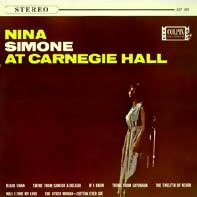
Stephen, thanks for a solid post on Eugene McDaniels. I knew the Les McCann version of “Compared to What”, but that was the extent of my awareness of his work. “Supermarket Blues” sure packs a wallop of defiance embedded in a tight groove that can propel a person through even the most tedious Excel spreadsheets at speed.
I do have to respond to one assertion in your piece though: while I can’t deny that McDaniels wields the word with the skill of a master knife-fighter, the defining “goddam” of the Civil Rights era does in fact belong to Nina Simone.
We’ve been wanting to get to “Mississippi Goddam” since we started this series, but truthfully its centrality to the concept of Antiracist protest in musical performance makes it hard to do it justice with the brevity we’re trying to bring to these posts.
Reportedly written in an hour in response to the murders of Medgar Evers and Emmett Till in Mississippi, as well as the 1963 Birmingham Church Bombing in Alabama, Mississippi Goddam cloaks seething outrage in a boppy little piano ditty that would be at home in any Broadway revue of the time. Simone seems to acknowledge this to her Carnegie Hall audience in the live recording from 1964 as she asserts, “This is a show tune, but the show hasn’t been written for it yet.” (While one can hear this plainly in the recording, we pull the quote from this excellent article by Malik Gaines in which he contextualizes Simone’s work: Simone’s body of recorded music reveals an anti-racist agenda enacted through performance. Simone used African-American musical, textual, and theatrical strategies, elaborating a history in which blacks have transformed the locations of marginality and exclusion into improvised positions from which to speak.)
However bouncy the tune, the lyrics do not pull any punches. Its opening stanzas make explicit the rage felt by people of color on a daily basis:
Alabama’s gotten me so upset
Tennessee made me lose my rest
And everybody knows about Mississippi Goddam
And later:
Hound dogs on my trail
School children sitting in jail
Black cat cross my path
I think every day’s gonna be my last
Lord have mercy on this land of mine
We all gonna get it in due time
I don’t belong here
I don’t belong there
I’ve even stopped believing in prayer
“Mississippi Goddam” nearly instantly became an anthem of the Civil Rights era, despite many radio stations (mostly in the south) refusing to play the song. In fact, as reported both in this Atlantic article and in an interesting Netflix documentary (streaming or at Lilly on DVD), most southern stations returned promotional packages with copies of the record snapped in half. It was an audience favorite in live performances, and Simone played it as a closing number in many of her concerts throughout the Sixties.
While browsing the web looking for a clip of the original release of the song (embedded above), I ran across this live recording from ’65 in Antibes. I was struck by what came across as Simone’s bone-deep fatigue as she turned in what was nonetheless an electrifying performance. How wearying it must have been to have been giving your all in so many performances of such a song, knowing that white audiences likely were listening but not hearing.
I guess I point this out as a way of saying that I hope we’re living up to our responsibility to practice a new kind of listening now at DUL.
…
So, speaking of the “now”, Stephen – we’ve spent some time on the history of Antiracism in music (and we’re far from done with that), but do you want to take us into the present day for a glimpse of Black Activism in the current music scene?

